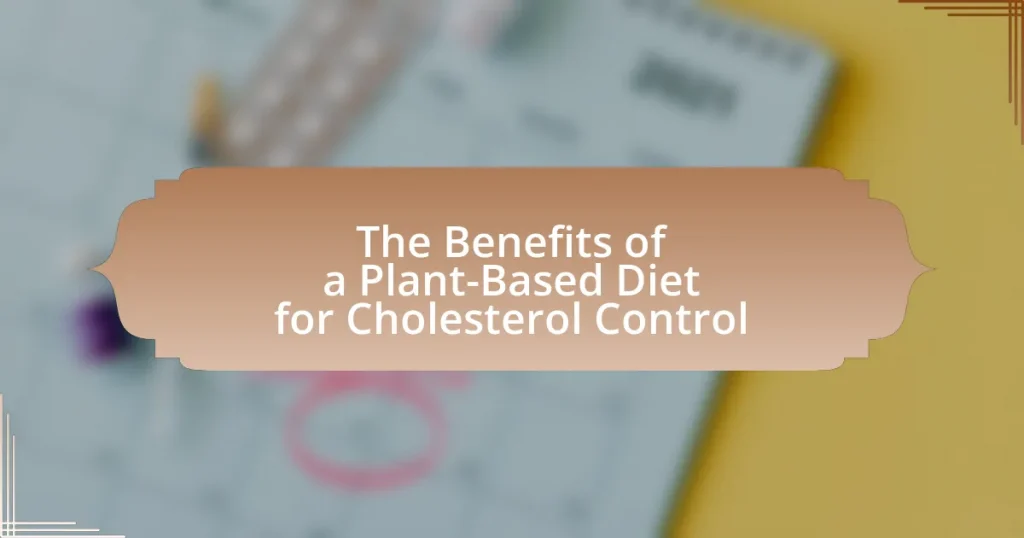A plant-based diet, which emphasizes foods derived from plants while minimizing or excluding animal products, has been shown to significantly lower cholesterol levels, particularly low-density lipoprotein (LDL) cholesterol, a key factor in cardiovascular health. Research indicates that individuals following this dietary approach can experience reductions in total cholesterol and LDL cholesterol by 10-30%, contributing to a decreased risk of heart disease. Key components of a plant-based diet, such as soluble fiber, plant sterols, and omega-3 fatty acids, play a crucial role in cholesterol management. Additionally, adopting a plant-based diet can lead to various health benefits, including improved weight management and lower blood pressure, making it an effective strategy for enhancing overall heart health.

What is a Plant-Based Diet and How Does it Relate to Cholesterol Control?
A plant-based diet primarily consists of foods derived from plants, including fruits, vegetables, whole grains, legumes, nuts, and seeds, while minimizing or excluding animal products. This type of diet is associated with lower cholesterol levels due to its high fiber content and low saturated fat intake. Research indicates that individuals following a plant-based diet can experience a significant reduction in total cholesterol and LDL cholesterol levels, which are key factors in cardiovascular health. For instance, a study published in the Journal of the American Heart Association found that participants adhering to a plant-based diet had a 30% reduction in LDL cholesterol compared to those consuming a standard diet. This evidence supports the effectiveness of plant-based diets in promoting cholesterol control and reducing the risk of heart disease.
How does a plant-based diet impact cholesterol levels?
A plant-based diet significantly lowers cholesterol levels. This dietary approach is rich in fiber, antioxidants, and healthy fats, which contribute to reducing low-density lipoprotein (LDL) cholesterol, often referred to as “bad” cholesterol. Research published in the Journal of the American Heart Association indicates that individuals adhering to a plant-based diet can experience a reduction in total cholesterol levels by an average of 10-15%. Additionally, a study from the American Journal of Clinical Nutrition found that participants who followed a vegetarian diet had lower cholesterol levels compared to those consuming a diet high in animal products. These findings demonstrate the effectiveness of plant-based diets in promoting heart health by managing cholesterol levels.
What specific components of a plant-based diet contribute to cholesterol reduction?
Soluble fiber, plant sterols, and omega-3 fatty acids are specific components of a plant-based diet that contribute to cholesterol reduction. Soluble fiber, found in foods like oats, beans, and fruits, binds to cholesterol in the digestive system, facilitating its excretion and lowering blood cholesterol levels. Research indicates that a diet high in soluble fiber can reduce LDL cholesterol by 5-10%. Plant sterols, present in fortified foods and certain nuts and seeds, compete with cholesterol for absorption in the intestines, effectively lowering cholesterol levels. Studies show that consuming 2 grams of plant sterols daily can reduce LDL cholesterol by about 5-15%. Omega-3 fatty acids, found in flaxseeds and walnuts, have been shown to lower triglyceride levels and improve overall heart health, contributing to better cholesterol profiles.
How do plant-based foods compare to animal products in terms of cholesterol content?
Plant-based foods contain no dietary cholesterol, while animal products typically contain significant amounts of cholesterol. For instance, foods such as fruits, vegetables, grains, and legumes are cholesterol-free, whereas animal products like meat, dairy, and eggs can contain anywhere from 50 to over 300 milligrams of cholesterol per serving. This difference is crucial for individuals managing cholesterol levels, as high dietary cholesterol intake is associated with increased blood cholesterol levels and a higher risk of cardiovascular diseases.
Why is cholesterol control important for overall health?
Cholesterol control is crucial for overall health because it helps prevent cardiovascular diseases, including heart attacks and strokes. High levels of low-density lipoprotein (LDL) cholesterol can lead to plaque buildup in arteries, increasing the risk of atherosclerosis. According to the American Heart Association, maintaining healthy cholesterol levels can reduce the risk of heart disease by up to 30%. Additionally, managing cholesterol through diet, such as adopting a plant-based diet, can improve lipid profiles and promote heart health.
What are the health risks associated with high cholesterol levels?
High cholesterol levels significantly increase the risk of cardiovascular diseases, including heart attacks and strokes. Elevated low-density lipoprotein (LDL) cholesterol can lead to the buildup of plaques in arteries, a condition known as atherosclerosis, which narrows blood vessels and restricts blood flow. According to the American Heart Association, individuals with high LDL cholesterol are twice as likely to develop heart disease compared to those with optimal levels. Additionally, high cholesterol can contribute to pancreatitis, a painful inflammation of the pancreas, particularly when triglyceride levels are also elevated.
How does cholesterol affect heart health specifically?
Cholesterol affects heart health by influencing the development of atherosclerosis, which is the buildup of fatty deposits in the arteries. High levels of low-density lipoprotein (LDL) cholesterol can lead to plaque formation, narrowing the arteries and restricting blood flow, which increases the risk of heart attacks and strokes. According to the American Heart Association, elevated LDL cholesterol is a significant risk factor for cardiovascular disease, with studies indicating that a reduction in LDL levels can lower the risk of heart-related events.

What are the Key Benefits of a Plant-Based Diet for Cholesterol Control?
A plant-based diet significantly lowers cholesterol levels by reducing saturated fat intake and increasing fiber consumption. This dietary approach emphasizes whole foods such as fruits, vegetables, whole grains, legumes, nuts, and seeds, which are naturally low in saturated fats and high in soluble fiber. Research indicates that soluble fiber can effectively lower LDL cholesterol, with studies showing that a daily intake of 5 to 10 grams can reduce LDL cholesterol by 5% to 10%. Additionally, plant-based diets are associated with lower levels of total cholesterol and triglycerides, as evidenced by a meta-analysis published in the Journal of the American Heart Association, which found that individuals following plant-based diets had a 29% lower risk of heart disease.
How does a plant-based diet lower LDL cholesterol?
A plant-based diet lowers LDL cholesterol primarily by reducing saturated fat intake and increasing dietary fiber. Foods such as fruits, vegetables, whole grains, legumes, nuts, and seeds are naturally low in saturated fats and high in soluble fiber, which binds to cholesterol in the digestive system and helps eliminate it from the body. Research published in the Journal of the American Heart Association indicates that individuals following a plant-based diet can experience a significant reduction in LDL cholesterol levels, with studies showing reductions of up to 30% in some cases. This effect is attributed to the combined impact of lower saturated fat consumption and higher fiber intake, which together promote better lipid profiles and cardiovascular health.
What role do soluble fibers play in cholesterol management?
Soluble fibers play a crucial role in cholesterol management by binding to cholesterol in the digestive system, which helps to lower blood cholesterol levels. When soluble fibers, such as those found in oats, beans, and fruits, are consumed, they form a gel-like substance that traps cholesterol and bile acids, preventing their absorption into the bloodstream. This process can lead to a reduction in low-density lipoprotein (LDL) cholesterol, often referred to as “bad” cholesterol. Studies have shown that a diet high in soluble fiber can reduce LDL cholesterol levels by 5-10%, contributing to overall heart health and reducing the risk of cardiovascular diseases.
How do antioxidants in plant foods contribute to heart health?
Antioxidants in plant foods contribute to heart health by reducing oxidative stress and inflammation, which are key factors in cardiovascular disease. These compounds, such as flavonoids and carotenoids, help neutralize free radicals, thereby protecting blood vessels from damage. Research indicates that diets rich in antioxidants, particularly from fruits and vegetables, are associated with lower rates of heart disease. For instance, a study published in the Journal of the American College of Cardiology found that higher intake of antioxidant-rich foods correlates with improved endothelial function and reduced arterial stiffness, both of which are crucial for maintaining heart health.
What additional health benefits can arise from adopting a plant-based diet?
Adopting a plant-based diet can lead to several additional health benefits, including improved heart health, weight management, and reduced risk of chronic diseases. Research indicates that individuals following a plant-based diet often experience lower blood pressure and cholesterol levels, which are critical factors in cardiovascular health. A study published in the Journal of the American Heart Association found that plant-based diets can reduce the risk of heart disease by up to 40%. Furthermore, plant-based diets are typically lower in calories and higher in fiber, aiding in weight management and promoting digestive health. Additionally, a meta-analysis in the journal Nutrients highlighted that plant-based diets are associated with a decreased risk of type 2 diabetes and certain cancers, reinforcing their role in chronic disease prevention.
How does a plant-based diet affect weight management?
A plant-based diet positively affects weight management by promoting lower calorie intake and higher nutrient density. Research indicates that individuals following plant-based diets tend to consume fewer calories while receiving essential nutrients, which can lead to weight loss or maintenance. A study published in the Journal of the American College of Nutrition found that participants on plant-based diets lost more weight compared to those on omnivorous diets, primarily due to the increased intake of fruits, vegetables, whole grains, and legumes, which are high in fiber and low in calories. This dietary pattern not only supports weight management but also contributes to overall health improvements, including better cholesterol levels.
What impact does a plant-based diet have on blood pressure?
A plant-based diet significantly lowers blood pressure. Research indicates that individuals adhering to a plant-based diet experience reductions in systolic and diastolic blood pressure levels. A meta-analysis published in the Journal of Hypertension found that plant-based diets can reduce systolic blood pressure by an average of 5.2 mmHg and diastolic blood pressure by 3.0 mmHg compared to omnivorous diets. This effect is attributed to higher intakes of fruits, vegetables, whole grains, and legumes, which are rich in potassium, magnesium, and fiber, all of which contribute to improved vascular health and lower blood pressure.

What Practical Steps Can One Take to Implement a Plant-Based Diet for Cholesterol Control?
To implement a plant-based diet for cholesterol control, one should focus on incorporating whole foods such as fruits, vegetables, whole grains, legumes, nuts, and seeds while eliminating or significantly reducing animal products and processed foods. Research indicates that a plant-based diet can lower LDL cholesterol levels; for instance, a study published in the Journal of the American College of Cardiology found that individuals following a plant-based diet experienced a 30% reduction in LDL cholesterol over 12 weeks. Additionally, meal planning that emphasizes high-fiber foods, such as oats and beans, can further aid in cholesterol management, as fiber has been shown to bind to cholesterol and promote its excretion. Regularly monitoring cholesterol levels and consulting with a healthcare provider can also ensure that dietary changes are effective and safe.
What are some easy ways to transition to a plant-based diet?
To transition to a plant-based diet easily, start by gradually incorporating more plant-based meals into your weekly routine. For instance, aim for “Meatless Mondays” to reduce meat consumption and explore various plant-based recipes. Research indicates that a gradual shift can lead to sustainable dietary changes, as it allows individuals to adapt their taste preferences and cooking habits over time. Additionally, replacing dairy with plant-based alternatives, such as almond or oat milk, can simplify the transition while maintaining nutritional balance. Studies show that individuals who make incremental changes are more likely to stick with a plant-based diet long-term, enhancing their overall health and cholesterol levels.
How can meal planning assist in adopting a plant-based lifestyle?
Meal planning assists in adopting a plant-based lifestyle by providing structure and ensuring a balanced intake of nutrients. By organizing meals in advance, individuals can incorporate a variety of fruits, vegetables, whole grains, legumes, nuts, and seeds, which are essential for maintaining optimal health and managing cholesterol levels. Research indicates that a well-planned plant-based diet can lower LDL cholesterol and improve heart health, as evidenced by a study published in the Journal of the American Heart Association, which found that participants following a plant-based diet experienced significant reductions in cholesterol levels. Thus, meal planning not only simplifies the transition to a plant-based diet but also enhances its health benefits.
What are some common plant-based foods to include in daily meals?
Common plant-based foods to include in daily meals are fruits, vegetables, whole grains, legumes, nuts, and seeds. These foods are rich in fiber, vitamins, and minerals, which contribute to overall health and can help lower cholesterol levels. For instance, oats and barley contain beta-glucans, a type of soluble fiber that has been shown to reduce LDL cholesterol. Legumes, such as beans and lentils, are also effective in cholesterol management due to their high fiber content and low saturated fat. Incorporating a variety of these foods into daily meals supports heart health and aligns with the principles of a plant-based diet aimed at cholesterol control.
What tips can help maintain cholesterol levels while following a plant-based diet?
To maintain cholesterol levels while following a plant-based diet, focus on incorporating high-fiber foods, such as oats, beans, and fruits, which can help lower LDL cholesterol. Research indicates that soluble fiber can reduce cholesterol absorption in the bloodstream, leading to improved heart health. Additionally, including healthy fats from sources like avocados, nuts, and seeds can support overall cholesterol balance. A study published in the Journal of the American Heart Association found that plant-based diets rich in these components significantly lower cholesterol levels. Regular physical activity and maintaining a healthy weight also contribute to effective cholesterol management within a plant-based framework.
How can one ensure adequate nutrient intake on a plant-based diet?
To ensure adequate nutrient intake on a plant-based diet, individuals should focus on consuming a variety of whole foods, including fruits, vegetables, whole grains, legumes, nuts, and seeds. This diverse selection provides essential nutrients such as protein, iron, calcium, omega-3 fatty acids, and vitamins B12 and D. For instance, legumes and quinoa are excellent sources of protein, while leafy greens and fortified plant milks can supply calcium. Research indicates that a well-planned plant-based diet can meet nutritional needs effectively, as evidenced by a study published in the Journal of the American Dietetic Association, which found that individuals following a plant-based diet had adequate nutrient intake when they included a variety of food sources.
What are some strategies for dining out while maintaining a plant-based diet?
To maintain a plant-based diet while dining out, individuals should research restaurant menus in advance to identify vegan options. Many restaurants now offer plant-based dishes or can modify existing meals to accommodate dietary preferences. Additionally, communicating dietary needs to the server can lead to customized meals that align with plant-based principles. Choosing ethnic cuisines, such as Indian or Mediterranean, often provides a wider variety of plant-based choices. Finally, opting for salads, vegetable sides, and grain-based dishes can help ensure adherence to a plant-based diet while dining out.










